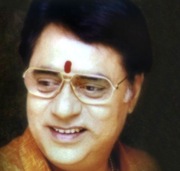Melodies interwoven with emotions; compositions originating from profound sentiments; heartfelt tunes plucking at the chords of intense feelings – Jagjit Singh is a legend who redefined the status of ghazals in Indian music and left this world with the eternal gift of soulful music. When the news of his death prompted me to hit play on a playlist of his ghazals on YouTube, I was struck by the magnitude of the lost treasure.
The year was 1965 when a young man, whose humble origins from the deserts of Rajasthan did not stop him from dreaming big, stepped into Mumbai to find work as a musician and in the process carved a niche for himself. Jagjit Singh’s rise to success did not happen overnight, but once recognized he single handedly reformed the music industry of India. When initially, ghazals could only be heard emanating from opulent households, Jagjit Singh opened this genre of music for the masses through his first album, The Unforgettables, which set new sales records.
The domain of ghazal singers in the 1970’s included well established names like Noor Jehan, Mehdi Hassan, Talat Mehmood and Begum Akhtar. He stepped into the realm of these powerful names, owned it and redefined it. Armed with only a harmonium and his powerful voice he gripped a crowd of thousands into a trance of musical harmony. With Jagjit Singh came a multitude of firsts seen by Indian music. The duo of Jagjit Singh and his wife Chitra was the first successful singing team comprising of a husband and wife and together they produced India’s first digitally recorded album, Beyond time (1987). The album still holds the record of being India’s largest selling album.
His take on ghazals that were not only classical, but designed for the masses was followed by venturing into the world of playback singing. In this field too, Jagjit Singh carved a place for himself amidst renowned singers like Kishore Kumar, Mukesh and Mohd. Rafi. Singing and composing were his innate talents and music came as second nature to him. Sitting with his harmonium, his fingers gliding over the keys, he seemed lost in a world of his own where music was the language and harmony, the air he breathed. His ghazals often contained lyrics from the poetry of great poets of the subcontinent like Mirza Ghalib, Qateel Shifai and Firaq Gorakhpuri.
With the passage of time Jagjit Singh’s ghazals acquired a soulful and increasingly poignant essence closely related to the sorrow within himself. Losing his only son in a car accident at a very young age left his heart in a perpetual state of mourning and that grief is apparent in his later music. His illness was consequently a result of this growing depression. The song he sang often after his son’s death, Miti da bawa, relates to losing a loved one at an early age. His music, which could mend broken hearts, probably originated from the need to mend a heart drowned in sorrow.
Suffering from a long illness of heart disease and diabetes, Jagjit Singh was laid to rest on 10th October, 2011. His relatives and friends have related this illness to the sadness that seemed to be eating away at his heart. A man known for his great sense of humour, he skillfully hid his sorrow from the world. Known for his humility and willingness to live for others, Jagjit Singh was a true icon of a man – a lyrical genius who will be alive forever through his enduring melodies.





